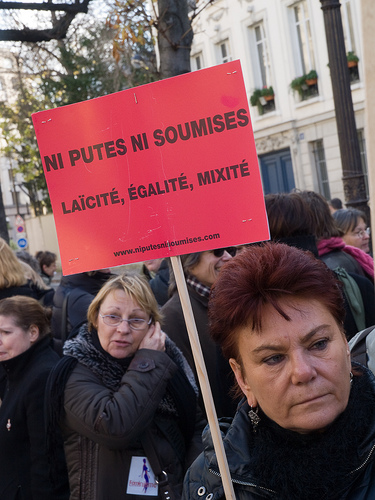Ni Putes Ni Soumises
Ni Putes Ni Soumises (Neither Whores Nor Submissives) is a France feminist movement, founded in 2003, which has  already secured the recognition of the French press and the National Assembly of France. It aims to combat Violence against women in the suburbs of France.
already secured the recognition of the French press and the National Assembly of France. It aims to combat Violence against women in the suburbs of France.
History
The movement began after a shocking crime in Vitry-sur-Seine. On the 4 October 2002, a 17 year old girl, Sohanne, was burnt alive in a rubbish bin in the council estate ‘Balzac’ in Vitry-sur-Seine. Outraged by this violent crime, the first demonstration against violence against women and for gender equality occured in Vitry-sur-Seine. The movement spread throughout France in 23 stages, allowing for opportunities to publicly debate in each city visited topics such as sexuality, gang rape, discrimination, gender-based violence, tradition, religion, forced marriage, gangs, women in council estates and social integration.
“La Marche des femmes des quartiers contre les ghettos et pour l’égalité” ended in a 30, 000 strong demonstration in Paris on 8 March 2003 ( International Women's Day ). Representatives of Ni Putes Ni Soumises were received by then French Prime Minister Jean Pierre Raffarin. Their message was also incorporated into the official celebrations of Bastille Day 2003 in Paris, when 14 giant posters each of a modern woman dressed as Marianne, the symbol of the French Republic, were hung on the columns of the Palais Bourbon, the home of the Assemblée nationale (the lower house of the French parliament).
Organisation
There are now 40 ‘Ni Putes Ni Soumises’ committees in France. NPNS has also established branches in Belgium, Sweden, Switzerland and Spain.
Objectives
NPNS fights against:
- all violence against women;
- racism, antisemitism, misogyny, discrimination, physical, moral and psychological violence;
- pressures to wear Veil
- pressure to stop attending school
- pressure to get Child marriage, without free choice of husband
- pressure to prevent young girls from attending sexual education and biology classes
- pressures to separate men and women in swimming pools and public places
- pressures to prevent people to determine their own sexual and emotional lives;
- patriarchal pressures that prevent women from using their body and lives freely
- homophobia
- cultural relativism
Political Impact
The French Government agreed to the following propositions after advocacy by NPNS:
- The publication of an educational guide dealing with respect, to be distributed in the housing projects and schools.
- The establishment of safe houses away from the housing projects for girls and women in immediate distress, where they can be safe in relative anonymity.
- The creation of six pilot sites where women will be able to have their voices heard.
- The organisation of training seminars for women to develop their particular strengths.
- Special provisions made in police stations for girls and women who have been the victims of violence.
Sources
- http://en.wikipedia.org/wiki/Ni_putes_ni_soumises
- http://www.niputesnisoumises.com/


